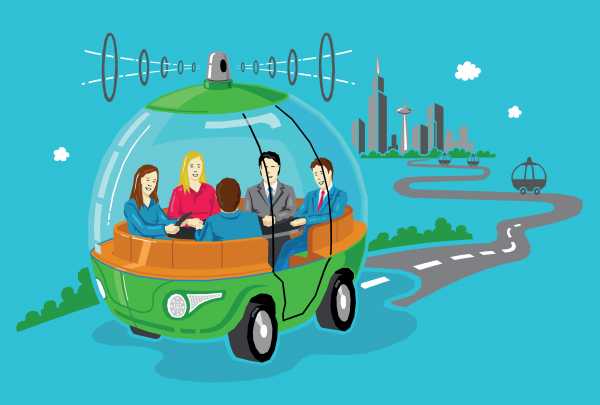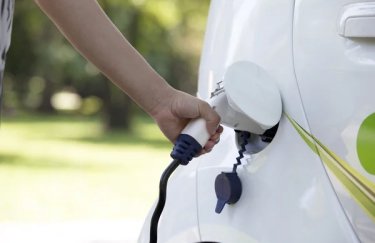

Finding the best ways to do good. Made possible by The Rockefeller Foundation.
President Donald Trump thinks self-driving cars are “crazy” and “will never work,” according to four sources quoted by Axios this week.
The sources, who reportedly had heard him privately discussing the new technology, recalled him slamming it on more than one occasion: “I would never get in a self-driving car.” “I don’t trust some computer to drive me around.” “Can you imagine, you’re sitting in the backseat and all of a sudden this car is zigzagging around the corner and you can’t stop the f—ing thing?”
But Trump’s not the only one who fears autonomous vehicles (AVs). A whopping 71 percent of American drivers would be afraid to ride in an AV, according to a new survey from AAA.
I confess that at this stage I’d feel pretty nervous about it, too. It’s hard to give up the sense of control that comes with being behind the wheel, and instead watch our bodies be carried along at fast speeds by invisible decision-making forces. That anxiety is not an entirely surprising reaction, given that last year saw a number of much-publicized AV fatalities, including an Uber crash that killed an Arizona woman one year ago this week.
But the fear is maybe not entirely rational, either. In the US, a pedestrian gets killed by a car about every 90 minutes, which means we humans aren’t such safe drivers. And although the question of current AV safety is still contentious, experts often note that AVs have the potential to be safer drivers than us because they’re free from many of the foibles that get us into trouble: texting while driving, cruising while drunk, falling asleep at the wheel. They also have capabilities we don’t, like LIDAR — “light-detection and ranging” — sensors that can scan the whole environment around the car.
As President Barack Obama argued in a 2016 pro-AV op-ed: “Right now, too many people die on our roads — 35,200 last year alone — with 94 percent of those the result of human error or choice. Automated vehicles have the potential to save tens of thousands of lives each year.”
That’s a sharp contrast from the views of the current president, which line up with his attitudes toward other autonomous tech. After the recent Boeing plane crashes, Trump tweeted, “Airplanes are becoming far too complex to fly … Always seeking to go one unnecessary step further, when often old and simpler is far better.”
Here, too, Trump’s reaction doesn’t seem especially rational. A pair of plane crashes is definitely a tragic outcome. But is “old and simpler is far better” necessarily the right takeaway?
No matter how many times experts tell us that cutting-edge technologies might be (or soon become) safer than earlier ones, many of us have a hard time giving up control, or the semblance of it. We also tend to fall prey to an availability heuristic: Our brains call up the most vivid or immediate context we’ve got when evaluating the risk of an unknown situation, and that context colors our judgment. This kind of cognitive shortcut serves us well much of the time by helping us make quick decisions. But sometimes it tricks us into acting irrationally.
Anxiety over automated transportation goes way back
Believe it or not, fears about self-driving cars go back a long way. In 1911, a British film called The Automatic Motorist teased out public fears about the way transportation might change in the future.
The film features a robot chauffeur tasked with driving a couple of newlyweds to their honeymoon. This turns out to be a very bad idea. The robot goes haywire and ends up driving them off the streets and into space, where they careen across the moon and loop around Saturn’s rings before finally being shot out of the sky. If you have six minutes, I highly recommend watching this:
In fact, people pretty much always get anxious when a new mode of transport is introduced, because surrendering control of our bodies is intuitively scary. Victorians fretted that high-speed railroad travel would make women’s uteruses spring out of their bodies. And as Quartz has noted, “In 1896, during the early days of the gas-powered automobile, a contributor to a British scientific journal warned that the vehicles were inherently less safe than the horse-drawn carriages they soon would replace, as a human driver ‘has not the advantage of the intelligence of the horse in shaping his path.’”
So how can we overcome our cognitive biases and ungrounded fears? One solution is for tech companies to help us along by introducing automation into products very incrementally. Let the public get a taste of it in bite-sized portions.
The new AAA study finds that the more exposure people have to AV tech, the more comfortable they become with it. (It’s perhaps worth noting that this is a result that AAA has an interest in finding, though it does seem pretty intuitive.) People who already have cars equipped with at least one advanced feature — lane-keeping assistance, adaptive cruise control, automatic emergency braking, or self-parking — are 68 percent more likely on average to trust the features than drivers who haven’t interacted with them.
Another thing companies can do to gain consumer trust is commit to greater transparency about the data and processes that go into making their cars. Researchers often lament that AV companies refuse to make their data publicly available for audit, viewing it as proprietary information. That limits researchers’ ability to detect potential biases — like the risk that AVs could fail to detect dark-skinned pedestrians — which in turn hampers their ability to reassure the public.
We all fear what we don’t know. If companies want us to trust them, they’ll need to make the fear manageable by pulling back the curtain of secrecy and by letting us taste the AV experience in small doses.
Although access to more information can help quell irrational fears, information alone is often not enough. Being emotional and not purely cognitive creatures, we sometimes need to accumulate firsthand experiences to convince us that a new technology might actually be okay — whether it’s a train, a car, or a driverless car.
Sign up for the Future Perfect newsletter. Twice a week, you’ll get a roundup of ideas and solutions for tackling our biggest challenges: improving public health, decreasing human and animal suffering, easing catastrophic risks, and — to put it simply — getting better at doing good.
Sourse: vox.com






